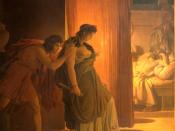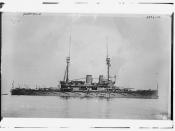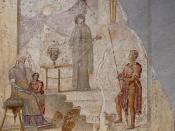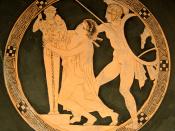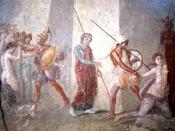"Cassandra"ÃÂ The character of Cassandra in Aeschylus is one of innocence, hardship, and victimization. Forced to the brink of madness by her visions, Cassandra could clearly see destruction coming, she could proclaim the warning, but no one would believe her. Dismissed as a lunatic and a crazy woman, Cassandra was then doomed to live through hardships and horrors she had envisioned. This included Ajax assaulting Cassandra in Athena's temple, in turn causing her to lose her innocence, and Cassandra's role as a victim leading to her own inevitable death in Agamemnon.
Cassandra, a strong female character and described by Homer as the most beautiful of Priam's daughters, was given the gift of prophecy by Apollo, who was mesmerized with her. Cassandra described Apollo as a god who "struggled to win me, breathing ardent love for me"ÃÂ (Agamemnon 1206). He promised to teach Cassandra the art of prophecy in return for sexual gratification.
After accepting the gift of prophecy, Cassandra did not keep her end of the arrangement and denied Apollo her body: "I consented to Loxia but broke my word"ÃÂ (Agamemnon 1208). Infuriated, Apollo added a condition to Cassandra's gift of prophecy; she was doomed to tell the truth, but no one would ever believe her. Persistently haunted by this, it eventually drove Cassandra to madness. For example, when Cassandra's brother Paris returned to Troy with Helen, Cassandra shrieked with dread and despair because she foresaw that Troy would be attacked and plundered by Greek armies coming to rescue Helen. Troy's peace and prosperity being shattered by Greek armies was difficult for their father, King Priam, to acknowledge. Believing that Troy's prosperous and peaceful independence would continue forever without quarrelsome Greeks at the gate was much more believable to King Priam. So he locked Cassandra in a palace room to keep her quiet. It was not before too long, however, that Troy was surprised by Greeks pounding at the gates. Another instance Cassandra prophesied but was not believed was when the Greeks had apparently given up and left Troy after a decade of unsuccessful plunder, and she warned that the wooden horse the Greeks left at Troy's front gate was full of soldiers. Believing the departed Greek armies would come back was also difficult for the Trojans. Envisioning a future without hostile Greeks surrounding them was more pleasant to the Trojans. Once again, however, Cassandra's prediction was not heeded. The Greek army invaded and burned Troy, unmercifully killing most of its inhabitants, while Cassandra fled to the temple of Athena. There she was raped by Ajax and loses her innocence. At this turning point, Cassandra realized what it meant to be nothing more than a sexual object and abandoned all hope about her gift of prophecy: "Already I prophesied to my countrymen all their disasters...[but] ever since that fault I could persuade no one of anything"ÃÂ (Agamemnon 1210-13).
Foretelling the doom of Agamemnon and herself through visions of a curse upon Agamemnon's household, Cassandra is a powerful character in Aeschylus's Agamemnon. After the total destruction of Troy, Cassandra was taken captive back to Greece by King Agamemnon. As she sails on Agamemnon's ship toward her own inevitable death, Cassandra accepts her role as a victim. Cassandra shows her acknowledgment of her impending death, which is similar to Agamemnon's daughter realizing her fate. Cassandra feels much of what Iphigeneia felt when she was thrown into the sea by Agamemnon himself. Even though Cassandra knew she was not going to die at that time, she realized what it meant to Agamemnon's victim. As soon as Agamemnon returned to his home in Mycenae, Cassandra warned him that his wife, Clytemnestra, and her lover, Aegisthus, were planning to kill him. Agamemnon did not want to believe his wife unfaithful to him, much less murderous. Envisioning a future, however, without wifely deception, betrayal, and malicious motives was more pleasant for Agamemnon to think about. So, he ignored Cassandra's prophetic warning. When both Cassandra and Agamemnon arrived, Clytemnestra greeted them warmly, trying not to be suspicious. Cassandra ignored Clytemnestra, ready to face her own fate. As Agamemnon followed his wife inside the palace, Cassandra stayed outside, caught in another vision, refusing to go any further. Cassandra proclaimed that she could smell blood and see visions of Thyestes, who ignorantly ate his own son. No one understood Cassandra, as always, and she was ignored as a crazy woman and lunatic as usual (Agamemnon 1214-1391). Cassandra ran into the palace, driven mad by those visions, wandered the halls, ranting and raving. After beheading Agamemnon with an axe, Clytemnestra chased Cassandra, planning to kill her with the same weapon (Agamemnon 1372, 1535). Cassandra understands, as she nears death, Clytemnestra's intentions to proceed with what she must do. The major basis for Cassandra's inability to resist fate, recognize the role of a victim, and accept the destiny that was foreseen in Agamemnon was her understanding toward the characters and their motives that contributed to her own fate.
Cassandra, a rare beauty, lived through one tragic event after another that lead her to recognize her role of the victim and to accept her foreseen death in Agamemnon. Cassandra was bribed with the gift of prophecy by Apollo, but after withholding her body from him, she was cursed with the gift. No matter what Cassandra envisioned, she would not be believed by anyone. After prophesying the fall of Troy, Cassandra was forced to watch the city burn when everyone ignored her warnings. Cassandra sought protection in the Temple of Athena during the fall of Troy, only to be raped by the Akhajan Ajax and in return losing her innocence. Then chosen by Agamemnon as a prize, Cassandra was taken from the only home she had ever known, only to anticipate through her gift of prophecy her own victimization and death in Agamemnon's house. In Aeschylus' Agamemnon, Cassandra was driven mad by her visions, yet she still proclaimed the truth in hopes that someone would believe her, only her truth-telling madness was agonizing and unbearable by mortals.
